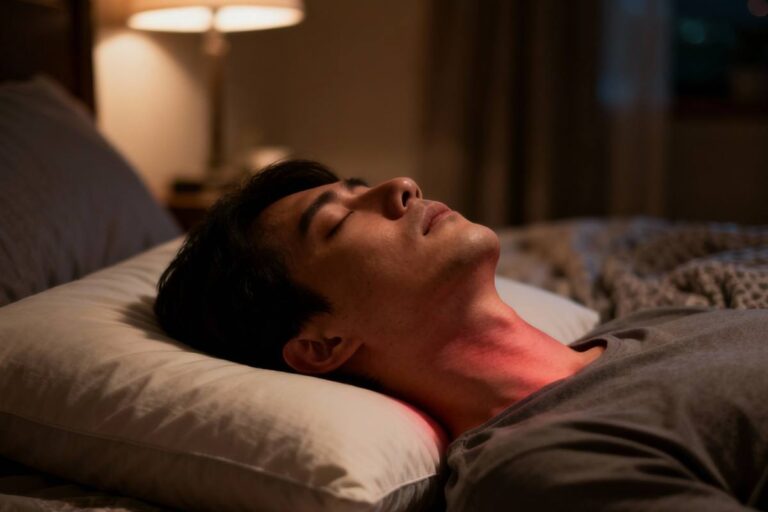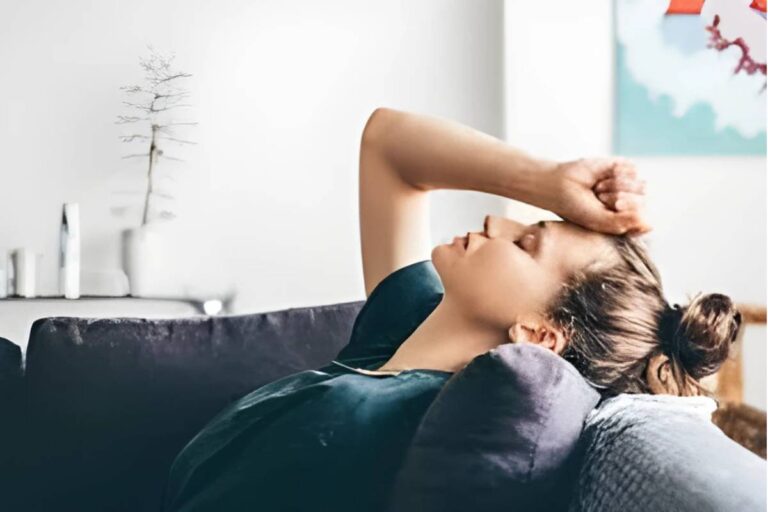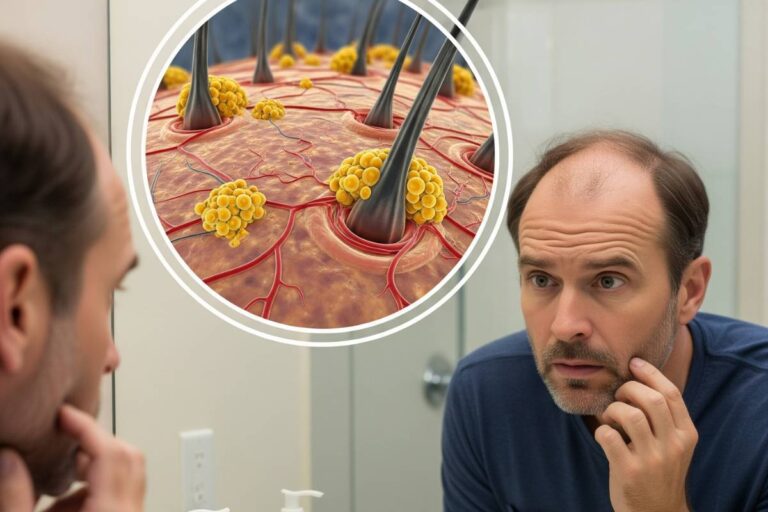A lot of people complain about insomnia and headaches, which can make it hard to get things done and feel good overall. A single night of reduced sleep can trigger a headache, while persistent sleep deprivation often leads to more frequent and intense headaches linked to sleep. are secondary headaches, which means they are signs of another illness, like insomnia in this case. Understanding the reasons insufficient sleep induces headaches is fundamental to prevention and effective treatment..
Learning About Headaches Due to Lack of Sleep
Sleep is necessary for brain homeostasis, and not getting enough sleep throws off a number of bodily functions. When you don’t get enough sleep, the brain’s pain-modulating systems don’t work as well, and you become more sensitive to pain. Also, not getting enough sleep throws off the balance of neurotransmitters like serotonin and dopamine, which are important for controlling pain.
The Role of Neurotransmitters and Blood Flow
Neurotransmitters such as serotonin assist in mood and nociception (the sensory perception of pain) regulation. Research indicates that sleep loss results in decreased serotonin levels, which can amplify the perception of pain and cause headache attacks addition, inadequate sleep interferes with cerebral blood flow, leading to vasoconstriction and vasodilation cycles in cerebral blood vessels that occur as throbbing or pressure‑type pain.
Circadian Disruption and Hormonal Imbalance
The body’s circadian rhythm controls more than just sleep-wake cycles; it also controls the release of hormones like cortisol and melatonin. The sleep disturbance will lead to excessive cortisol production at inappropriate times and insufficient melatonin production, resulting in a pro-inflammatory condition that heightens the risk of headaches. This hormonal imbalance also harms brain function, which makes the stress response even less effective. This makes tension headaches and migraines even worse.
Causes of Headache from Lack of Sleep
Sleep deprivation headaches may occur after a single night of inadequate rest or build up over days of reduced sleep. Major contributing factors are:
- Acute Sleep Loss: A single night of 1–3 hours less sleep can cause a headache that lasts for hours or a whole day
- Chronic Insomnia: Long‑term trouble falling or remaining asleep is linked to a two-to threefold rise in risk for tension‑type headaches and migraines
- Disrupted Sleep: Repeated awakenings disrupt sleep structure, blocking restorative deep and REM sleep periods that are critical to brain recovery
- Poor Sleep Hygiene: Irregular bedtime, bed exposure to the screen, and stimulants (caffeine, alcohol) near bedtime may all lead to sleep loss and resulting headaches
- Underlying Sleep Disorders: Sleep apnea and restless legs syndrome result in frequent sleep interruption, leading to an increased incidence of morning headaches
Prevalence and Impact
Headaches associated with sleep deprivation are experienced by most adults at some time. Up to 60% of individuals with insomnia have morning headaches according to In addition, population-based studies show that chronic insufficient sleepers are 2–3 times more likely to experience frequent tension-type headaches and migraines compared to healthy sleepers. The consequences reach beyond pain: sleep‑related headaches compromise cognitive functioning, mood stability, and overall quality of life, resulting in decreased productivity and increased healthcare utilization.
Symptoms and Types
A headache due to a lack of sleep may occur in several forms:
- Tension‑Type Headache: Most frequent presentation, with a dull, squeezing headache around the forehead or at the back of the head
- Migraine-Like Headache: Throbbing pain of moderate to severe intensity, usually unilateral, sometimes with light sensitivity, nausea, or aura
- Hypnic (“Alarm Clock”) Headache: Infrequent headaches that wake people up from sleep, usually between 1–3 a.m., and more frequent after the age of 50
- Chronic Daily Headache: Headache present ≥15 days/month for over three months; sleep deprivation is a major perpetuating factor
Widely reported concurrent symptoms are irritability, problems concentrating, and mood changes that also contribute to enhanced pain perception
Short‑Term and Long‑Term Effects
Short-term effects of nocturnal wakefulness are lower mental performance, decreased reaction speed, and fleeting changes in mood. Untreated chronic sleep loss can:
- Enhance the number and severity of headaches
- Increase the risk of chronic pain disorder
- Contribute to cardiovascular conditions from prolonged elevation of stress hormones
- Disrupts immune function, rendering them more vulnerable to illness
Prevention Strategies
Prevention of headache due to sleep deficiency focuses on maximizing the quality and regularity of sleep:
Sleep Hygiene Tips
- Regular Schedule: Retire and rise at the same times every day, even weekends, to strengthen your circadian rhythm
- Wind‑Down Routine: Spend a minimum of 30–60 minutes before bedtime on relaxing activities—reading, stretching lightly, or meditation—and avoid screens
- Sleep‑Conducive Environment: The bedroom should be kept cool, dark, and quiet; blackout curtains and white noise machines may be needed
- Limit Stimulants: Do not use caffeine or nicotine at least 6 hours before going to bed; keep alcohol consumption near bedtime to a minimum, as it breaks up sleep
- Mindful Napping: If naps are required during the day, restrict them to 20–30 minutes before mid‑afternoon to avoid disruption of nighttime sleep
Lifestyle Modifications
- Regular Exercise: 30 minutes or more of moderate aerobic exercise on most days enhances sleep quality and latency, but steer clear of strenuous exercise in the two hours before bedtime
- Stress Management: CBT, mindfulness, or progressive muscle relaxation can help alleviate insomnia and headaches that go with it
- Dietary Factors: Consume regular, balanced meals; do not have large meals in the three hours leading up to bedtime, and keep an eye on consumption of headache‑inducing foods (e.g., blue cheese, bacon)
Treatment Strategies
Simple measures may be enough for occasional sleep deprivation headaches, whereas frequent cases may need specific treatments.
Over-the-Counter Treatments
- Analgesics: Mild to moderate tension-type headache can be relieved by acetaminophen, ibuprofen, or aspirin, typically within 20–60 minutes
- Combination Products: Certain formulas combine caffeine with analgesics for increased pain relief, but excessive caffeine exacerbates sleep disturbances.
Prescription Medications and Therapies
- Triptans: Triptans (e.g., sumatriptan) are very effective in aborting attacks of migraine‑type headaches but must be utilized cautiously to prevent medication‑overuse headache.
- Preventive Medications: For chronic conditions, low-dose antidepressants, anticonvulsants, or beta-blockers can decrease the frequency of headaches.
- Cognitive Behavioral Therapy for Insomnia (CBT‑I): Shown to enhance sleep quality and reduce headache frequency by changing maladaptive sleep beliefs and behaviors
- Biofeedback and Relaxation Training: May reduce muscle tension and stress, providing drug-free relief from tension-type headaches.
When to Seek Medical Attention
See a healthcare provider if you have:
- Headaches that become worse or do not improve with routine treatments
- Recurring headaches (15 days/month) even after making lifestyle changes
- Other symptoms include changes in vision, weakness, or fever
- Suspected underlying sleep disorder ( sleep apnea, chronic insomnia)
A physician can conduct an in-depth evaluation, determine comorbid conditions, and suggest specialist treatments or referral to sleep specialists and neurologists.
Conclusion
A headache from not getting enough sleep is a major cause of pain and disability that can be changed. By figuring out what causes these headaches, like problems with neurotransmitters or hormones, and following evidence-based sleep hygiene and lifestyle habits, people can greatly reduce how often and how bad these headaches are. When these simple steps don’t work, targeted drug and behavioral treatments can help even more. Prioritizing restorative sleep not only alleviates pain but also enhances overall health, mood, and productivity, making it essential for both immediate comfort and enduring well-being.
















